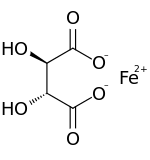Ferrous tartrate
 | |
| Names | |
|---|---|
| IUPAC name
(2R,3R)-2,3-dihydroxybutanedioate; iron(2+) | |
| Other names
Iron wine, Ferrous tartrate, Vinum Ferri | |
| Identifiers | |
| ATC code | B03 |
| 41014-96-4 | |
| ChemSpider | 4954134 |
| |
| Jmol-3D images | Image |
| PubChem | 6451676 |
| |
| Properties | |
| C4H4FeO6 | |
| Molar mass | 203.92 g/mol |
| Appearance | Reddish powder |
| Pharmacology | |
| Bioavailability | yes |
| Oral | |
| Legal status | |
| |
| Except where noted otherwise, data is given for materials in their standard state (at 25 °C (77 °F), 100 kPa) | |
| Infobox references | |
Ferrous tartrate is a chemical compound and the iron(II) salt of tartaric acid.[1]
Historical uses
Ferrous tartrate has been used as a steel medicine.[2][3] It was generally prescribed during the 19th and early 20th centuries. It is usually prepared by digesting for 30 days, 2 ounces (880 gr) tartarated iron[4] in a pint of sherry.[5] It can be difficult to prepare.[6]
Historically, it was used as a stomachic and tonic, at a dose of 2 tbsp.[5] It was also used to treat anemia, dose 1 to 2 fl. dr.[7]
References
- ↑ http://www.chemspider.com/Chemical-Structure.7970014.html
- ↑ Pharmacopoeia of the City of London Hospital for Diseases of the Chest, Victoria Park (in Latin). London. 1908. p. 50.
- ↑ J. A. Forret (1891). "Notes on Iron Wine". The Pharmaceutical Journal and Transactions. J. & A. Churchill. pp. 640–641.
- ↑ Harry Napier Draper (1864). Manual of the medicinal preparations of Iron, including their preparation, chemistry, physiological action, and therapeutical use. With an appendix, containing the Iron Preparations of the British Pharmacopœia. p. 118.
- ↑ 5.0 5.1 Ruoff, Henry W. (1901). The Century Book of Facts. King-Richardson Company. p. 405.
- ↑ The Analytical Review, Or History of Literature, Domestic and Foreign, on an Enlarged Plan 2. 1788. p. 195.
- ↑ Brunton, T. Lauder (1885). "B.P. Vinum Ferri". A Text-Book Of Pharmacology, Therapeutics And Materia Medica (3rd ed.). Macmillan And Co.
| ||||||||||||||||||||||||||||||||||||||||||